At the Movies--Was My Great-Grandfather a Revolutionary? Part One.

An open thread review of current political movies!

As you can see, I've changed the Open Thread a bit. I've decided to focus on movies with overtly political themes. I'm going to mostly focus on current movies, but when there are none, I'm going to dig around in Netflix and Amazon Prime to see if I can find some great old political movie that I can share.
I'll be giving y'all a review, and rating the movies on a scale of 1 to 5 Savios.

A no-Savio movie is working for the machine: destructive to truth, human rights, or continued life on this planet. A five-Savio movie is indispensable to anyone fighting the machine.
If anybody has a movie they want me to bring to the attention of the community, please send me a private message and I'll review it.
I couldn't find a current political movie this week, so I dove into a political documentary that's been hanging out in my Netflix queue: The Cuba Libre Story.
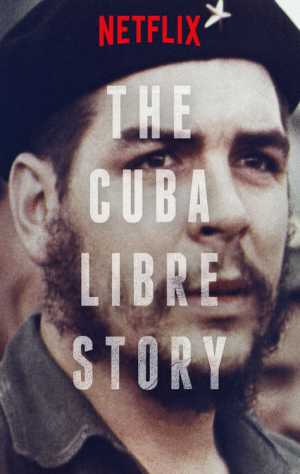
It's a good thing they put Che on the movie poster, or people wouldn't know if they were going to get history or mixology.
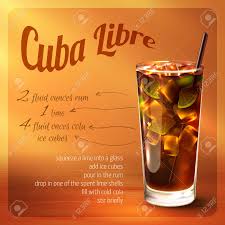
This is actually not a movie, but a miniseries with eight episodes. The first episode covers basically from Columbus to the first Cuban president, Tomas Estrada Palma. It gives basic, introductory history which is, surprisingly, not awful: it has some standard American assumptions, but doesn't display the horrible levels of propaganda I often expect to find on this topic. In fact, the filmmaker interviewed people from Cuba, the US, Germany, Switzerland, Spain and France. I think a genuine attempt was being made to not reduce the history to axe-grinding on either side. And, basic though it was, I actually learned a lot, including something that made me question my own family history.
What's fascinating about Cuba is that this country, which symbolizes revolution to inhabitants of the United States, was originally the most anti-revolutionary nation you can imagine; in fact, it combines within itself, and displays, in horribly blatant fashion, all the things which the left hates: colonialism, genocide, capitalism, slavery, and monocultural agriculture. Perhaps it's not an unmixed blessing to be the first place Christopher Columbus set foot in this hemisphere.
But of course it didn't start that way. Humans have lived in Cuba for at least 4,000 years. Indigenous Cubans were the first humans to raise and smoke tobacco. They lived in caves and palm huts, and farmed and fished.
And then one day they met an Italian merchant. The Italian merchant was glad to see them, because he had found no gold or spices so far on his trek, and had to have something to show his benefactors back home. "These people would make good slaves," he noted in his diary.
Why is it never decent people who make treks into unknown hemispheres?
You can guess how the story goes. Columbus brought some of the Cubans back with him (he called them Indians, of course.) He said:
THESE PEOPLE WOULD MAKE GOOD SLAVES!
Oddly, the story diverts here from its accustomed path; apparently Ferdinand and Isabella said NO SLAVES! I find that really odd, and one of the few things in the documentary that was hard to believe. Since when did the Spanish colonies not use slavery? The documentary says that, well, the boys just ignored what their monarchs said once their ships were out of sight of Europe. And I guess we're supposed to think that Ferdinand and Isabella either never knew or pretended not to. Either way, they told Columbus to go back and conquer the islands.
The Europeans had a lot of advanced arms. The natives had none. The Europeans had horrendous diseases. The natives got sick. About 90% of them died in the first few years after contact. Before dying, they introduced the Europeans to tobacco. (Apparently they also introduced the Europeans to syphilis, which is a bit of karma if I ever saw one.)
Under the pressure of European culture, or perhaps I should say imperialistic capitalism, tobacco turned from something the people smoked to make them feel good into the island's primary colonial cash crop. Tobacco is apparently a very labor-intensive crop, in that the plant requires a great deal of attention and care. In order for tobacco to produce the right profit margins for the colonists, incredibly cheap labor was essential.
And the Spaniards said THESE PEOPLE WOULD MAKE GOOD SLAVES!
Unfortunately for them--or maybe fortunately--they also became dead slaves very quickly, making the Spanish look around for a substitute population they could enslave. So they kidnapped or bought Africans and enslaved them instead. Eventually 2 million African slaves were brought to Cuba (not to the New World; that figure is more like 12 million).
Here is where the story gets horribly fascinating, because the history of Cuba becomes intertwined with that of its sister, Haiti. I'm starting to get the feeling in middle age that I was not taught enough when I was young about the Haitian slave rebellion, which was barely mentioned in my history classes, when in fact it could be said to have ignited the abolition movement worldwide.
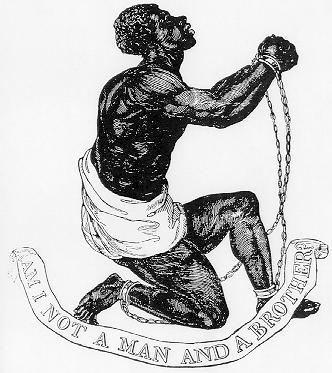
I guess American public schools don't want to give anyone the idea that slaves rising up against their masters and killing them all with machetes and ending the entire global sugar trade for a few years is a possible event. Much less that those former slaves could then get together with other dispossessed people and found a non-slave state.
For those who don't know, the Haitian slaves, who outnumbered their masters by 432 thousand to 32 thousand, overthrew them in 1791 and burned the sugar mills, temporarily ending the global sugar trade.
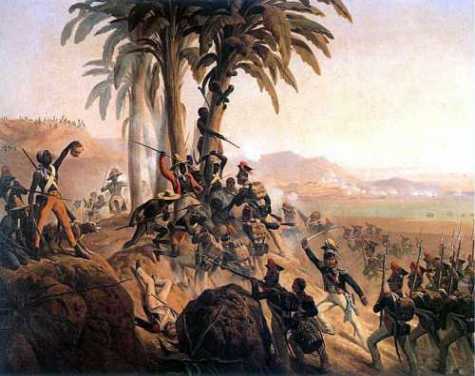
I would love to be able to say that this inspired the Cuban slaves and poor whites to rise up in a similar populist rebellion. But although so many slaves lived in Cuba that 60% of the present-day population of Cuba has ancestry among them, there were not enough of them to accomplish what happened in Haiti. What happened instead is the reason I say that, until the Castro revolution, Cuba was closer to being the most anti-revolutionary part of Latin America. Instead of noticing the upsurge of liberty in their neighbor, what Cubans noticed was a giant hole in global trade. No more colonial Haiti meant no more sugar trade.
So Cuba decided to become the sugar trade.
As with tobacco, sugar required a large, incredibly cheap source of labor to create commensurately immense profits.
You see where this is going.
The Cubans said: THESE PEOPLE MAKE GOOD SLAVES!
Cubans invited the former Haitian plantation owners to bring their money and expertise to Cuba, where there were plenty of slaves. By the mid-nineteenth century, Cuba had become the global sugar trade.
Because of this, for roughly a hundred years after Haiti's slave rebellion, a large number of Cubans, especially the upper and merchant classes in Havana and western Cuba, clung to Spanish colonialism like a babe to its mother. (I wonder if my family were among them? Since their name was Gomez, it's not particularly easy to trace where their plantation was, east or west, which is more important than you might think). As the world turned more and more against slavery, at least its most legal and obvious forms, Cuba's only hope of preserving slavery--and thus, the huge profits of the sugar trade--was the Spanish military. As soon as that was withdrawn, other powers, like England, would move in and end slavery in Cuba, and with it the massive wealth of the Cuban 1%. In addition, Spain itself, which had been an increasingly teetering empire, was propping up its economy on that sugar trade.
So like I said: imperialism, slavery, genocide, capitalism, and monocultural agriculture, all wound together in a tight regressive cocoon. And my mother's mother's mother's family somewhere in the middle of that cocoon.
Cuba burst the cocoon in stages. Or, perhaps, the most accurate thing to say is "Third time's the charm." I was fascinated by the fact that Cuba's first two attempts at revolution were very much like our own revolution; middle-class merchants and property owners and upper-class plantation owners and intellectuals, all of them irritated economically and some of them irritated ideologically, with European colonialism. I'd expected something more like a delayed version of Haiti's slave rebellion. But Cuba's first revolution actually started among eastern plantation owners (you see why I'm curious about where the Gomez family lived). Carlos Manuel de Cespedes, a name I'd never heard before yesterday (really, history is taught pretty abominably here, even with the countless number of well-intentioned overworked teachers who could probably do a better job if they were given the conditions to do so), was an eastern plantation owner who freed his slaves and declared Cuban independence in 1868.
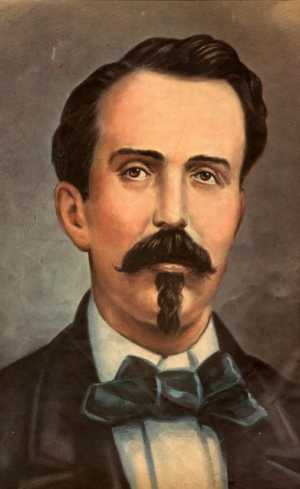
Most people think Cespedes did this cynically, in that, if he freed his slaves, while the Spaniards continued to support slavery, he would create an immediate army. Still, in my view, it's the best thing that happened in Cuba since Columbus set foot there, and I'm not inclined to be overcritical. What's amazing about Cespedes and the Ten Years' War is that he was vastly outnumbered by the Spanish, his troops were unskilled in warfare, and they were often using machetes against the Spaniards' guns--yet they kept winning. They took most of Eastern Cuba. (My great-grandfather wasn't there yet; he was still a boy in Asturias across the sea. But I do wonder where my great-grandmother's family stood). Things got so bad for the Spaniards that they had to draft large numbers of western Cubans to fight against the eastern revolutionaries, turning the uprising into a Civil War. (I'm betting my great-grandmother's family was on the wrong side of all this, as they would hardly have accepted a Spanish soldier as their daughter's fiance a generation later if they were against colonialism. But I can't be sure.)
The Spanish thought they would be smart, and simply cede the eastern half of Cuba to the rebels. There was nothing there they wanted anyway. So they tried to divide the island in half with barricades and entrenched forces.
The revolutionaries just busted through them.
To give some perspective here, the war started with 7,000 Spanish soldiers and 30,000 Cuban volunteers on the colonial side--against 12,000 revolutionaries, many of them freed slaves fighting with machetes. Spain reinforced those troops with 33,000 more Spaniards. And Cespedes kept winning.
I guess when people think they're fighting for their freedom and families they fight harder than when they think they're fighting for the right of Spain to hold onto an island in the Caribbean.
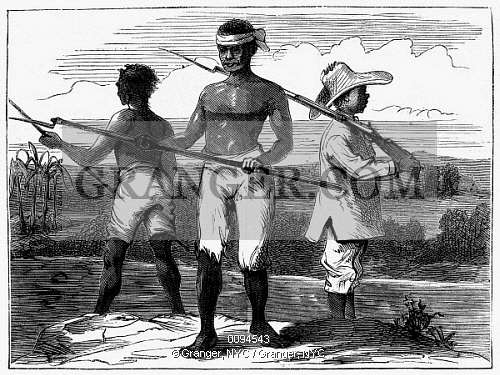
However, eventually Cespedes was killed, along with 100,000 other people in that war--and when he died, his movement crumbled. Spain, a little shaken by how badly they did, agreed to some reforms, which they only enforced half-heartedly at best. Thousands of the surviving rebels emigrated to the US, in an odd reverse echo of what happened in the 1950s. One of them was the poet and journalist Jose Marti, also called El Maestro for his teaching of Afro-Cubans to read and write. He brought together a Cuban revolutionary movement in exile (I have a horrible feeling that this is what the Cuban exiles of the fifties, if any are still alive, think they've been doing in the US for the past seventy years: propagandizing the American empire to back an ethical revolution against bad people, like Jose Marti did. Perhaps the fact that Cespedes' revolution was led by plantation owners makes it easier for them to make the mistake.)
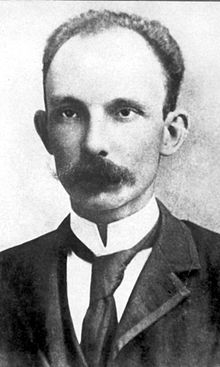
I know Marti looks a bit solemn and dorky, as is often the way with mid-nineteenth century men of European extraction, no matter where they're from. But I think of him as a true visionary, passionately motivated by his ethics. And he was largely responsible for convincing people to mount the Cuban War for Independence.
He is still inspiring people today.
Sadly, he had no military experience. In 1895 he charged the Spanish lines at the Battle of Dos Rios and was killed. Most people think he did it on purpose, though some think it was his inexperience in battle that led to him making a stupid mistake.
(By this time my great-grandfather must have been in Cuba. And the Americans were about to show up...)
I Have a White Rose to Tend (Verse XXXIX)
I have a white rose to tend
In July as in January;
I give it to the true friend
Who offers his frank hand to me.
And for the cruel one whose blows
Break the heart by which I live,
Thistle nor thorn do I give:
For him, too, I have a white rose.
CULTIVO UNA ROSA BLANCA... (Verso XXXIX)
Cultivo una rosa blanca,
En julio como en enero,
Para el amigo sincero
Que me da su mano franca.
Y para el cruel que me arranca
El corazón con que vivo,
Cardo ni oruga cultivo:
Cultivo la rosa blanca.

Part II next week!


Comments
Good morning, everybody.
Another day in the empire; it's good on days like this to remember the revolutionaries of the past.
"More for Gore or the son of a drug lord--None of the above, fuck it, cut the cord."
--Zack de la Rocha
"I tell you I'll have nothing to do with the place...The roof of that hall is made of bones."
-- Fiver
My Great Grandfather Definitely Was
Although the British were calling them terrorists during 1916 and the War of Independence.
His son (my great uncle) interviewed Castro & Guevara about a year or so after the revolution - apparently the first western journalist to do so but I can't find the article online anywhere. He carried the photograph of the three of them in Castro's office in his wallet until his death.
One thing about Haiti, they were never forgiven for their uprising, look how they continue to be punished and who wields the whip hand. Well, we have long memories too and time and numbers are on OUR side.
@gendjinn You have Cuban family as
You have Cuban family as well? Or are you, perhaps, Cuban yourself?
"More for Gore or the son of a drug lord--None of the above, fuck it, cut the cord."
--Zack de la Rocha
"I tell you I'll have nothing to do with the place...The roof of that hall is made of bones."
-- Fiver
Used to be 100% Irish....
but then the ole fella retired and started doing genealogy research.
Seems we are descended from every single Norman/English/British invasion from du Sauvage in the north in late 12th century through Henry VII, Elizabeth I, Cromwell. As if that weren't bad enough there's even a link to one of two bastards reputed to be Elizabeth I's. But no Cuban. Just the invaders mixed in with the paleolithic hunter-gatherers that followed the retreating ice sheet into Ireland.
@gendjinn The British called
The British called everybody terrorists, or whatever the word was they used before they came up with "terrorist." Empires do that. It can never be their fault. The Clintons and their faction really epitomize this characteristic, which is one reason I think they're so hated. The Bushes, too.
"More for Gore or the son of a drug lord--None of the above, fuck it, cut the cord."
--Zack de la Rocha
"I tell you I'll have nothing to do with the place...The roof of that hall is made of bones."
-- Fiver
Oh yeah, and quite sanguine we are about it too.
Sure this week saw Enda Kenny standing in his office below a giant portrait of Michael Collins, reflecting critically upon Martin McGuinness' unacceptable use of violence.
Thing is. It seems that optic was a lightning bolt that awoke the realisation in a lot of people in Ireland that hey perhaps the PIRA's fight was an extension of that which liberated most of Ireland a hundred years ago. With the distance of 20 years from the slaughter people are looking at the period from 1966 when Unionism started bombing, shooting and murdering people, police and electricity generation stations (which they tried to pull off as a false flag and pin it on the non-existant IRA). And they are asking the question "How can McGuinness or the PIRA be responsible when they did not even come into existence until late 1969, AFTER the British Army had been deployed on the streets?"
@gendjinn That is so damned cool
That is so damned cool about your great uncle. I don't suppose you have a copy of the picture?
"More for Gore or the son of a drug lord--None of the above, fuck it, cut the cord."
--Zack de la Rocha
"I tell you I'll have nothing to do with the place...The roof of that hall is made of bones."
-- Fiver
Alas no, I believe it is from a Florida newspaper of the day.
Hoping that eventually the digitization of newspapers gets it on the web and it shows up in my search some day.
@gendjinn Or am I remembering
Or am I remembering correctly that you're Irish?
"More for Gore or the son of a drug lord--None of the above, fuck it, cut the cord."
--Zack de la Rocha
"I tell you I'll have nothing to do with the place...The roof of that hall is made of bones."
-- Fiver
It would have been great if my grandmother had
been more forthcoming. She talked a lot about her father, but not about why he came to this country.
In retrospect, and far too late, I should have asked my Aunt Peachie (her real name was Victoria). She was the rebellious one of the bunch, and probably would have told me a version of the truth (though she was pretty angry at her father, unlike my grandma, who worshipped the ground he walked on. Difficult to work your way through all these emotions to something like the truth).
Like a typical child and teenager, I didn't ask, just inwardly sighed as Grandma started talking about her father again for the umpteenth time, saying the same things.
My only excuse is that asking her questions about her family's past usually didn't help much. She had created the things she wanted to say about it, and repeated them, and mostly stuck to them. There was some painful stuff back there, which may have been why.
"More for Gore or the son of a drug lord--None of the above, fuck it, cut the cord."
--Zack de la Rocha
"I tell you I'll have nothing to do with the place...The roof of that hall is made of bones."
-- Fiver
I have an appointment this morning, but I'll be back
later to catch your comments! Have a great day.
"More for Gore or the son of a drug lord--None of the above, fuck it, cut the cord."
--Zack de la Rocha
"I tell you I'll have nothing to do with the place...The roof of that hall is made of bones."
-- Fiver
Very interesting
About two years ago, FSU hosted an art show of a collection of Cuban art spanning from the late 1800's to the modern era. Around the turn of the century (1900), apparently Cuban had a very robust arts movement and many of the top Cuban artists went to Europe to study and return to Cuba to teach at the national academy.
I am looking forward to reading your next installment.
Do I hear the sound of guillotines being constructed?
“Those who make peaceful revolution impossible will make violent revolution inevitable." ~ President John F. Kennedy
@gulfgal98 Thanks, gg.
Thanks, gg.
I keep hoping against hope that "opening" Cuba will not mean killing it and raising it as a capitalistic zombie of itself.
"More for Gore or the son of a drug lord--None of the above, fuck it, cut the cord."
--Zack de la Rocha
"I tell you I'll have nothing to do with the place...The roof of that hall is made of bones."
-- Fiver
Is Trump thinking of closing down relations again?
I heard a whisper a few weeks back but nothing since.
@gendjinn Didn't hear that. I
Didn't hear that. I only follow what Trump does on pretty specific issues/areas, because my bet is he won't be here long. He's a chess piece that thinks he's a player, and he has a couple of alliances that make it difficult to immediately eject him, but it will happen. Also, 90% of the evil shit he does, or will do, is the same evil shit that any other President will also do, with increasing frequency and intensity as the years go on. So most of what I pay attention to with regard to Trump lies in the couple of areas where he differs from the status quo, for good or ill.
"More for Gore or the son of a drug lord--None of the above, fuck it, cut the cord."
--Zack de la Rocha
"I tell you I'll have nothing to do with the place...The roof of that hall is made of bones."
-- Fiver
Yum! Another delicious multi-course meal
of a thread starter. You are spoiling us. Thank you.
I wonder: Are there any five Savio American films about modern U.S. politics, other than documentaries? I can think of some that were a cut above the usual rom com fare, like Primary Colors and Ides of March. Both of those were about a modern Democratic candidate for POTUS whose adultery created most of the film's drama. But, neither rose to level five, IMO. Perhaps, if an American film about modern US politics were indispensable to anyone fighting the machine, no one would finance it?
Every time I think of sugar and "New World" slaves, I think of Boston's bizarre, tragic molasses flood of 1919. (Have I mentioned I have ADD?) https://en.wikipedia.org/wiki/Colonial_molasses_trade; https://en.wikipedia.org/wiki/Great_Molasses_Flood
@HenryAWallace Not sure. I think there
Not sure. I think there might be some five-Savio films in the documentary category. Laura Poitras' Citizen Four at least rates 4 Savios, IMO, maybe 5. I haven't watched the rest of her stuff. El Norte is a fictional movie which rates 4 Savios at least. Dirty Wars gets at least 3 1/2 Savios, maybe more; Gasland also exists in that range. I notice most of my selections here have to do with foreign policy one way or another. Do we have any good movies about what's happening domestically (not that the two things are completely separable)?
I'm pretty sure Occupy never got a 4- or 5-Savio movie made about it, unless you count this, which I'd give 5 Savios to, easily. But it's not just about the United States:
Personally, I love The 4400, and give it 4 Savios instead of 5 only because it got cancelled midstream (something else that often happens to movies and television shows with a high Savio rating). It's not overtly a political commentary, though. However, I'm used to watching science fiction for hidden (or not-so-hidden) political commentary, because, well, science fiction often does that. It either makes political, cultural, social critiques--or it goes full-bore into hating the alien other, as in War of the Worlds and Independence Day, which are pretty two-dimensional and easily usable by bad-faith bastards.
"More for Gore or the son of a drug lord--None of the above, fuck it, cut the cord."
--Zack de la Rocha
"I tell you I'll have nothing to do with the place...The roof of that hall is made of bones."
-- Fiver
The Internet's Own Boy: The Story of Aaron Swartz
This movie is infuriating and absolutely heartbreaking, but so worth watching. It left my husband and me both in tears. For a relatively current documentary (2014) on what our government does to us here at home, don't miss this one. It's available on YouTube.
I loved The 4400
So annoying when it got cancelled midstream. Great show.
Did you ever watch Alien Nation? It was a long time ago, but I remember really liking it too, as political commentary sci fi.
@CS in AZ I didn't watch it,
I didn't watch it, but I was aware it existed. I wonder what I was doing at the time, why I didn't watch it? I usually grab every bit of science fiction I can short of things like War of the Worlds or Independence Day.
"More for Gore or the son of a drug lord--None of the above, fuck it, cut the cord."
--Zack de la Rocha
"I tell you I'll have nothing to do with the place...The roof of that hall is made of bones."
-- Fiver
My memory was foggy too
I looked it up just now. It was first a feature movie, in 1988, which was rather dark and depressing. Then it was remade as a tv show, which was more multifaceted and humorous. Unfortunately and unexpectedly it was cancelled after one season, which had ended with a cliffhanger. Then there was a book and a series of comic books which tried to pick up the story where it had been left. (Never read any of those). Finally there were five TV movies, released from 1994 through 1997, which picked up at the original series cliffhanger ending and continued the story. We did watch and enjoy all of those.
With all that, it's easy to see why you might have skipped it. All still available if you're interested. I would skip the original film, as the TV show and subsequent TV movies are better and tell a complete story without it. I'm a big sci fi fan also, as you might have guessed.
Dirty Wars was like reading the US version of The Troubles.
The Troubles came to be known as The Dirty War in the 80s, even had a book of the same title like Scahill. Reading his and watching the doc it was the same f*cking play, just different actors and scenery.
But somehow we just gotta rescue people from their lives with good christian bombs. It's a moral imperative apparently. Growing up 60 miles down from the road from the whole thing I saw far too many mothers, fathers, brothers, sisters, cousins, friends, colleagues standing by gravesides or police tape bawling their eyes out. I still remember the face of what should have been the last casualty Stephen Restorick, only 18, his poor mother.
Thanks! I am bookmarking this useful info.
but, just for reference, my post said "other than documentaries"
@HenryAWallace Yeah, I was having a
Yeah, I was having a hard time coming up with them...El Norte is not a documentary, so that's one....if we're talking about overtly political movies that aren't documentaries, that's tough. I find I keep sliding back into science fiction: The 4400, The Dead Zone, The Hidden....
Well. There's Dave, which I guess rates about 2 1/2 Savios.
Older movies might help more....oh, I know!
Hopscotch gets at least 3 Savios.
I heard The Killing Fields was good, but never saw it. Also Full Metal Jacket, though it's brutal. If you're talking fictional movies, it seems most of the worthy ones are about war or espionage--so few about anything that's happening domestically. Most of the ones coming to mind were made before the end of World War II.
There must be some good movies about the Civil Rights movement, surely. I remember Long Walk Home was unobjectionable. I should see the Malcolm X biopic (do biopics count as fiction or documentaries for you?)
"More for Gore or the son of a drug lord--None of the above, fuck it, cut the cord."
--Zack de la Rocha
"I tell you I'll have nothing to do with the place...The roof of that hall is made of bones."
-- Fiver
I think sci fi movies are often intended to be political.
For one thing, if you pretend it's science fiction, you can get away with saying a lot more without getting gobs of blowback. For another, we tend to label anything set in the future as science fiction, whether it is or not.
In 1984, for example, was saying, "This is really where I think the Russia of today wants to take us. BEWARE!" There was imagination, but very little science and very little fiction in that novel.
So far, I don't think I saw you cite "any five Savio American films about modern U.S. politics, other than documentaries," did I? But, I will look into some of the films you did cite. Between Comcast's "On Demand," Netflix and Amazon Prime, I may get a chance to see all of them, who knows? (A friend gave me Netflix and Amazon Prime. I buy only the minimum that Comcast will give me with On Demand, which is what I watch more than anything else.)
@HenryAWallace I'm adopting a
I'm adopting a policy of giving 5 Savios out only rarely.
"More for Gore or the son of a drug lord--None of the above, fuck it, cut the cord."
--Zack de la Rocha
"I tell you I'll have nothing to do with the place...The roof of that hall is made of bones."
-- Fiver
Thanks.
I guess the outcome is that I cannot think of any U.S. films about modern U.S. politicians that would fit your criterion for 5 savios and that is not a documentary.
In the documentary line, I might include Moore's films and An Inconvenient Truth. None of them accomplished the goal we assume the film maker desired, but anyone trying to fight the machine for those goals should see those films, I guess.
@HenryAWallace Holy shit. That's like a
Holy shit. That's like a less horrible version of Passchendaele (less horrible because it lasted less time, affected fewer people, and wasn't on purpose.)
"More for Gore or the son of a drug lord--None of the above, fuck it, cut the cord."
--Zack de la Rocha
"I tell you I'll have nothing to do with the place...The roof of that hall is made of bones."
-- Fiver
Yes, horrific.
@HenryAWallace And you're welcome.
And you're welcome.
"More for Gore or the son of a drug lord--None of the above, fuck it, cut the cord."
--Zack de la Rocha
"I tell you I'll have nothing to do with the place...The roof of that hall is made of bones."
-- Fiver
The Candidate with Robert Redford,
Bulworth with Warren Beatty. Might be in that category. I would rate them much higher than either PC or IoM but not sure what merits 5 Savios (having just read the term).
@HenryAWallace
Thanks! Although that particular link had Wiki disclaiming all knowledge of it, so I looked it up separately: https://en.wikipedia.org/wiki/Great_Molasses_Flood
But aren't we glad that all remaining shreds of corporate/billionaire burdensome regulative public/environmental protections are to be removed, guaranteeing that such interesting results can become common-place and a (potentially expensive) source of amusement for Those Who Matter as they cut back on excess population among the non-billionaire poors and other life not known to be useful to them at the time?
Psychopathy is not a political position, whether labeled 'conservatism', 'centrism' or 'left'.
A tin labeled 'coffee' may be a can of worms or pathology identified by a lack of empathy/willingness to harm others to achieve personal desires.
Fantastic diary !!! Thanks !!!
Many years ago, PBS did a tremendous 3-part series on Latin music, its history and the growth of its influence on popular music around the world. It's hosted by young Harry Belafonte, and focuses mainly on musicians from Cuba, with lots of interviews and other old film footage. Available on DVD and on YT:
Roots of Rhythm: Part 1 of 3
Roots of Rhythm: Part 2 of 3
Roots of Rhythm: Part 3 of 3
There's a really great segment in the first episode where Belafonte goes to the docks in Havana and films the workers doing rumba on their lunchtime, wearing their hard-hats. A worker explains a performance by one of the dancers:
"This lame guy comes along and tries to dance, but he can't. As the music enters his body, he starts to straighten up. He stands straighter and taller, and finally his lameness disappears. The music is a kind of medicine."
@PhilK Thank you so much! That's
Thank you so much! That's going in my must-watch queue.
"More for Gore or the son of a drug lord--None of the above, fuck it, cut the cord."
--Zack de la Rocha
"I tell you I'll have nothing to do with the place...The roof of that hall is made of bones."
-- Fiver
Very nice start of a new series, thanks for the links
It reminds me of how important it is to write a timeline of one's family history. In my family there were African and Portuguese who married into ours and others who emigrated to the US in third quarter of the nineteenth century. All their memories of colonial times in their places of origins are forgotten now and descendants are dying away. Very sad to see that happen. Sadder even to see how difficult it is to retrieve documents to show and explain what exactly happened in their lives.
I really enjoyed your OT essay.
https://www.euronews.com/live
@mimi Thanks, Mimi. I believe
Thanks, Mimi. I believe in remembering as many stories as we can. Unfortunately, like I said, I was too thoughtless to gather the stories while I could.
"More for Gore or the son of a drug lord--None of the above, fuck it, cut the cord."
--Zack de la Rocha
"I tell you I'll have nothing to do with the place...The roof of that hall is made of bones."
-- Fiver
Thanks, CStS. I absolutely love your rating system.
That, in its essence, is fascism--ownership of government by an individual, by a group, or by any other controlling private power. -- Franklin D. Roosevelt --
@enhydra lutris Heh. :-).
Heh. :-).
The current era is having the interesting effect of showing me what my most deeply-held values are. Savio is pretty close to the core of them. So, in different ways, are Edward Snowden and Ed Murrow, though they're not quite as close as Savio.
"More for Gore or the son of a drug lord--None of the above, fuck it, cut the cord."
--Zack de la Rocha
"I tell you I'll have nothing to do with the place...The roof of that hall is made of bones."
-- Fiver
This essay was a joy
and a pleasure to read and experience. Thanks so much, CSTS. I very much look forward to part 2.
As to other political movies, I'm going to pm you with some suggestions, perhaps from a different point of view from many of the fine suggestions offered here.